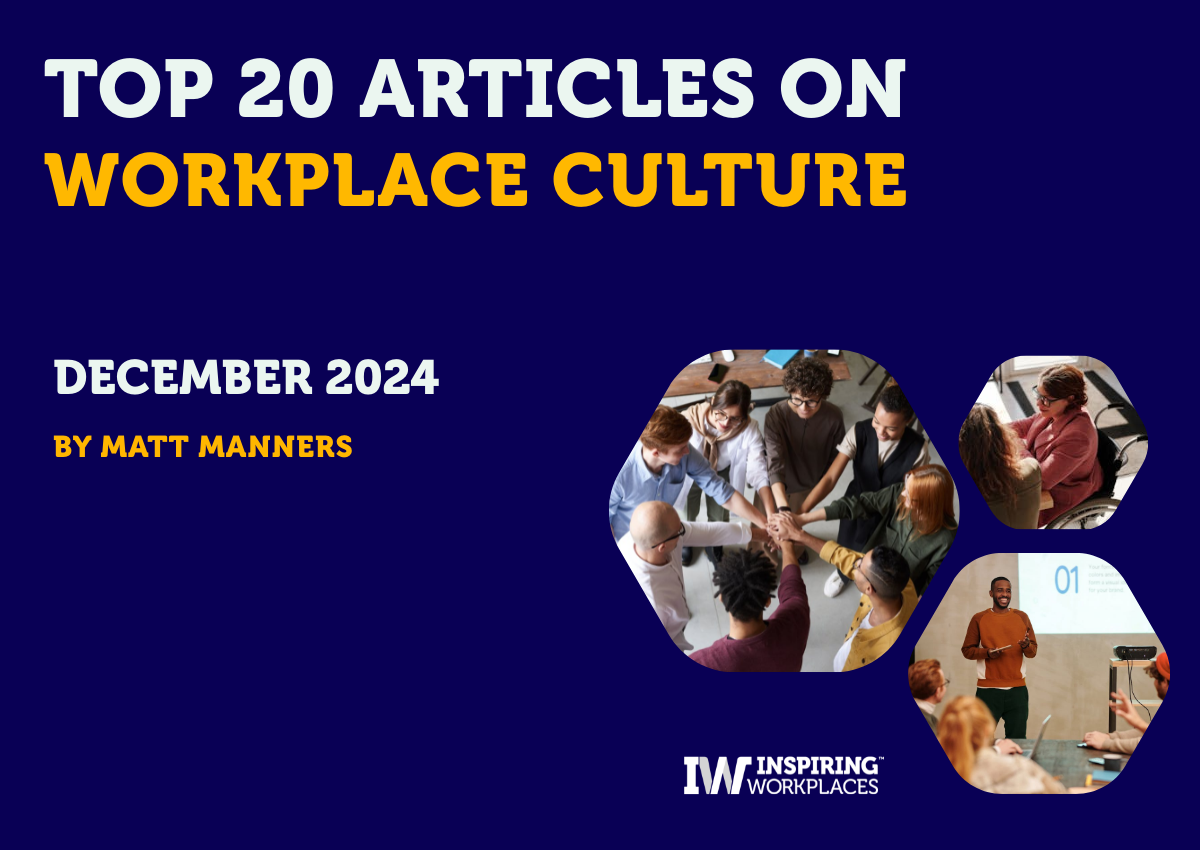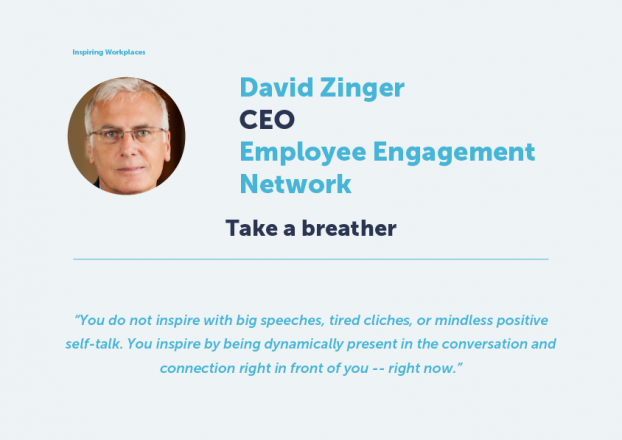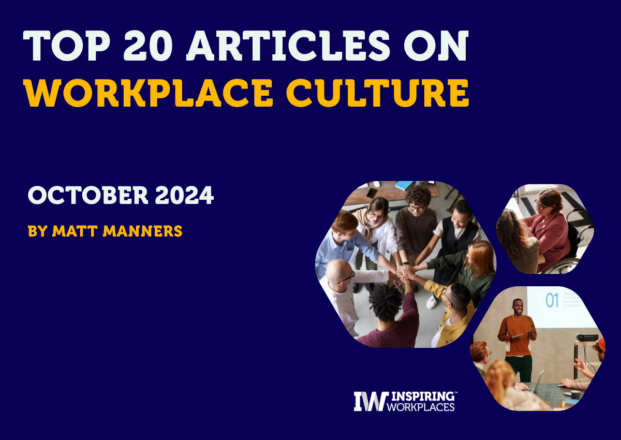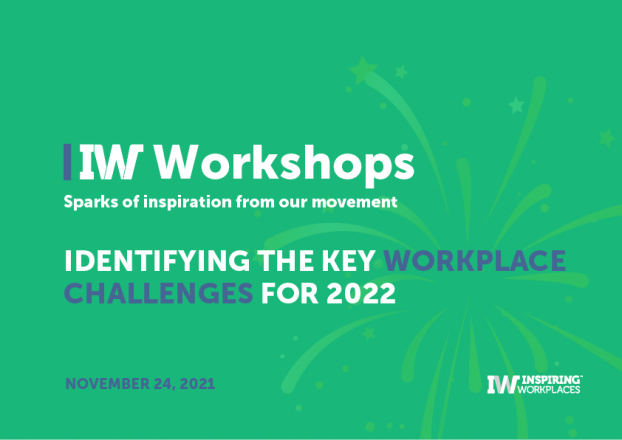
19th December 2024
Top 20 Articles on Workplace Culture: December 2024

Welcome to the Inspiring Workplaces Top 20 Articles on Workplace Culture for December 2024.
We want to help inform and inspire you from some of the best content out there. Each month we will consolidate these articles for you to help give you a quick and easy snapshot. To help drive you and your organisations forward.
The articles will be underpinned by seven key elements that are reflected in our bespoke COMPASS methodology, that also underpin the Top Inspiring Workplaces worldwide. They are:
- Wellbeing
- Culture & Purpose
- Leadership
- Inclusion
- Employee Experience
- Communication & Voice
- Society & Sustainability
Key Workplace Culture Learnings from December:
- Consistent Communication Builds Stability: Regular check-ins align teams and reinforce goals, especially in remote and hybrid settings.
- Embed Core Values Daily: Highlight and celebrate company values in meetings, training, and team discussions to foster unity.
- Timely Recognition Matters: Spontaneous, specific, and frequent recognition boosts morale, enhances productivity, and encourages excellence.
- Proactive Transparency Reduces Uncertainty: Early sharing of updates builds trust and mitigates fear of sudden disruptions.
- Prioritize Quality Over Quantity: Encourage strategic, meaningful work over “hustle culture” to prevent burnout and drive innovation.
- Flexibility Promotes Belonging: Flexible policies enhance work-life balance, employee satisfaction, and engagement.
- Tech-Driven Employee Engagement: Use AI and data insights to offer personalized benefits and improve the employee experience.
- Leadership Adapts Through Change: Leaders must embrace evolving work models, fostering transparency, collaboration, and adaptability.
- Recognition Drives Retention: Employees are more likely to stay in environments where they feel appreciated by leaders and peers.
- Culture of Belonging Boosts Retention: Inclusive leadership that supports diverse perspectives and strengths fosters a sense of connection and commitment.
The articles are as follows…
7 Workplace Challenges for 2025
Source: Gallup Workplace
Authors: Ben Wigert, Ph.D. and Ryan Pendell
IW COMPASS point: Employee Experience, Trends
Key Takeaways
- The Great Detachment: Disengagement is at an all-time high, with employees feeling disconnected from their organization’s mission, affecting productivity and morale.
- Economic Influence on Engagement: Poor job markets increase dissatisfaction, while improving markets shift employees from anger to indifference, rather than to high engagement.
- Declining Employee Wellbeing: Wellbeing metrics are at record lows; fostering a culture of care is essential for sustained performance and retention.
- AI Adoption Challenges: While organizations invest in AI, employee adoption lags without clear guidance, training, and support for effective implementation.
- Child Care as a Barrier: Women face greater challenges in career progression due to child care responsibilities, requiring structural and cultural workplace changes.
- Feedback and Recognition Gaps: Managers often overestimate their feedback and recognition efforts; creating consistent habits can improve employee satisfaction and performance.
- Hybrid Work Collaboration: Effective hybrid teams establish charters, optimize in-person collaboration, and regularly reassess their workflows for continuous improvement.
Read the full article here
It’s Time to Write Your Playbook for Employee Trust
Source: Fast Company
Author: Darcy Tuer
IW COMPASS point: Employee Voice
Key Takeaways
- Consistent Communication Builds Stability: Regular check-ins, like daily or weekly scrums, align teams and reinforce strategic goals in remote and hybrid environments.
- Embed Core Values Into Daily Practices: Highlight and celebrate company values frequently, from interviews to team meetings, to create a unified and purpose-driven culture.
- Proactive Transparency Eases Uncertainty: Share updates early, even if incomplete, to keep employees informed and reduce fears about sudden changes or disruptions.
- Feedback Must Lead to Action: Use tools like eNPS surveys and “Ask Me Anything” sessions to gather insights and demonstrate responsiveness through tangible changes.
- Employee Trust as a Growth Strategy: Trust fosters engagement, alignment, and resilience, making it a foundational investment for organizational success.
Read the full article here
5 Key Ingredients to Doing Employee Appreciation Right
Source: IW Guest Post
Author: Harvey Deutschendorf
IW COMPASS point: Employee Experience
Key Takeaways
- Recognition Drives Retention and Productivity: Employees are more motivated and likely to stay when they feel genuinely appreciated by leaders and peers.
- Personalized Recognition Matters: One-size-fits-all recognition fails; tailored acknowledgment that aligns with individual preferences fosters deeper employee satisfaction.
- Timely and Frequent Acknowledgment: Immediate, spontaneous recognition creates stronger emotional impacts and encourages ongoing excellence.
- Peer-to-Peer Recognition Enhances Workplace Bonds: Encouraging employees to recognize each other builds camaraderie and ensures quieter high performers aren’t overlooked.
- Avoid Favoritism: Allowing unbiased group input in recognition decisions prevents resentment and maintains fairness within teams.
Read the full article here
84% Of Workers Agree This One Key Workplace Interaction Is Flawed
Source: Forbes
Author: Lindsay Kohler
IW COMPASS point: Communication
Key Takeaways
- Collaboration is Critical but Flawed: Despite its importance, 84% of workers find workplace collaboration ineffective, often due to its invisible and poorly understood nature.
- Technology Enhances Visibility: Tools like collaboration trackers can reveal activity levels, address inequities, and uncover silos to improve workflows and team dynamics.
- Differentiate Collaboration from Coordination: Collaboration involves real-time teamwork for innovation, while coordination is sequential task management. Confusing the two leads to inefficiencies.
- Quality Over Quantity in Collaboration: Effective collaboration involves strategic, meaningful interactions rather than defaulting to unnecessary real-time engagement or excessive meetings.
- Promote Asynchronous Work: Prioritizing asynchronous methods minimizes collaboration overload, boosts productivity, and ensures balanced contributions across teams.
Read the full article here
Do You Have Leadership Paralysis?
Source: Workplace Insight
Author: Jennifer Bryan
IW COMPASS point: Leadership
Key Takeaways
- Leadership Paralysis is Common: Leaders struggle with overwhelming challenges like hybrid work, generative AI, neurodiversity, and sustainability goals.
- Acknowledge Change: The old leadership methods no longer apply; leaders must adapt to a constantly evolving world.
- Start with Vision and Purpose: Leaders must pause, reflect, and collaboratively identify their organization’s vision, values, and direction to move forward effectively.
- Observation and Collaboration: Leaders and teams should observe their current state without judgment, share insights, and create a unified understanding of the business’s needs.
- Test and Refine: Once the vision feels aligned, gather employee feedback to ensure organizational goals resonate at every level.
- Challenges Become Clearer: A defined vision simplifies addressing issues like employee belonging, hybrid policies, and sustainability, making solutions more actionable and aligned.
Read the full article here
From a Four-day Workweek to Pet PTO, Employee Benefits in 2025 Will Focus on Personalization
Source: Worklife
Author: Tony Case
IW COMPASS point: Employee Experience, Benefits
Key Takeaways
- Personalized Benefits Are the Future: A one-size-fits-all approach is outdated; tailored benefits like curated stipends and marketplaces allow employees to meet their unique needs.
- Wellness Programs Are Evolving: Traditional EAPs are being replaced with holistic, nonclinical mental wellness benefits that show genuine care for employees’ well-being.
- Four-Day Workweek Gains Traction: The shortened week boosts productivity, reduces burnout, and supports better work-life balance, focusing on outcomes over hours.
- Pet-Centric Benefits Reflect Modern Families: Pet adoption leave and pet insurance highlight evolving family benefits, aligning with employees’ expanding definitions of “family.”
- Ongoing Benefits Assessment Is Crucial: HR leaders must regularly evaluate benefits to ensure they reflect employee needs, organizational values, and provide measurable ROI.
Read the full article here
Why Future-Focused Leaders Need To Prioritize Workforce Sustainability
Source: Forbes
Author: Mind Share Partners
IW COMPASS point: Society & Sustainability
Key Takeaways
- Workplace Sustainability Requires Systemic Change: Toxic work habits like long hours and an “always-on” mentality harm both mental health and productivity. Leaders must reimagine workflows to prioritize well-being.
- Address Root Causes of Burnout: Burnout stems from heavy workloads, lack of autonomy, and unfair practices—not from a lack of self-care tools or wellness apps.
- Successful Companies Redesign Work Practices: Examples include Ikea (raising salaries, flexible schedules, subsidized childcare) and Mastercard (hybrid work, meeting-free days, mental health initiatives). These changes reduced turnover and improved well-being.
- The Workforce Majority Drives Change: Gen Z, Millennials, women, caregivers, and marginalized groups demand work environments that value mental health and well-being.
- Well-Being is Critical for Talent Retention: Top talent will leave workplaces that fail to prioritize mental health. Employers must adapt to meet emerging workforce expectations.
Read the full article here
More Than a Program: A Culture of Women’s Wellbeing at Work
Source: Gallup Workplace
Authors: Kristin Barry, Kate Den Houter and Karen Guggenheim
IW COMPASS point: Wellbeing
Key Takeaways
- Work-Life Imbalance Increases Stress and Burnout: Women juggle personal responsibilities at work and after hours, leading to higher stress and burnout compared to men.
- Parenting Challenges Impact Careers: Women are disproportionately expected to address childcare issues, causing them to reduce hours or decline promotions.
- Rigid Work Schedules Don’t Align with Women’s Preferences: While 54% of women prefer a blended work style, 75% follow rigid splitter schedules, leading to disengagement and job-seeking behavior.
- Managers Play a Critical Role in Wellbeing: Managers must receive training to support women in balancing work and life through meaningful conversations and flexible support systems.
- Organizations Must Build a Culture of Wellbeing: Leadership needs to champion wellbeing initiatives, communicate resources clearly, and address employee concerns to foster trust and engagement.
Read the full article here
‘Ebullient leadership’ Can Lift Your Workers Out of The Doldrums and Increase Productivity
Source: The Sector
Authors: Saima Ahmad and Nilupama Wijewardena
IW COMPASS point: Leadership
Key Takeaways
- Ebullient Leadership Promotes Engagement: Leaders who create fun, playful environments inspire employees to feel excited and engaged at work.
- Curiosity Drives Knowledge-Sharing: Curiosity combined with ebullient leadership enhances informal learning and collaboration among employees.
- Lighthearted Activities Improve Productivity: Social lunches, trivia, and games rejuvenate workers, reduce burnout, and foster creativity without sacrificing goals.
- Balance Work and Play: Fun activities must align with organizational goals and respect individual employee preferences.
- Emotional Intelligence Matters: Optimistic and emotionally aware leaders create psychologically safe spaces, encouraging risk-taking and idea-sharing.
Read the full article here
4 Day Week Improves Staff Health But Clashes With Business Needs, New Trial Finds
Source: HR Grapevine
Authors: Liam Soutar, featuring research by Charlotte Rae, PhD & Emma Russell
IW COMPASS point: Wellbeing
Key Takeaways
- Improved Employee Wellbeing: The trial showed a 14.7% drop in burnout, 20% improvement in sleep, and reduced stress and anxiety levels.
- Productivity Maintained: Despite shorter hours, goal attainment increased by 19.4%, indicating no loss in productivity.
- Operational Challenges Persist: Thrive found a five-day workweek “essential” to meet customer expectations, highlighting limitations for businesses serving traditional schedules.
- Seasonal Flexibility as a Compromise: Instead of full adoption, Thrive plans to implement a flexible, seasonal approach to balance benefits and business needs.
- Systemic Change Needed: For widespread adoption, cultural and systemic shifts across industries are required to align customer and employee expectations.
Read the full article here
Fully Remote Work Plummeted in 2024
Source: Inc.
Author: Sarah Lynch
IW COMPASS point: Employee Experience
Key Takeaways
- Decline in Fully Remote Work: The share of companies offering fully remote work fell from 21% in 2023 to 7% in 2024.
- Cultural Concerns Take Priority: Employers cited cultural challenges as a leading reason for reducing remote options, increasing from 53% to 59%.
- Rise of Structured Hybrid Work: Mandates for in-office attendance (e.g., three days a week) grew from 37% to 53%, reflecting a hybrid work trend.
- Full-Time Office Work Edges Up: Full-time, five-day office attendance rose slightly from 16% to 20% in 2024.
- Strategic Remote Hiring Continues: Remote hiring increased to 22%, with a focus on candidates possessing traits like self-motivation, communication skills, and independent work abilities.
Read the full article here
Trust – the Key to Better Teams and Stronger Leadership
Source: IW Guest Blog
Author: Roy Fletcher
IW COMPASS point: Leadership
Key Takeaways
- Trust Is the Foundation of Team Success: Trust enhances communication, adaptability, and performance, while its absence causes low morale, turnover, and reduced productivity.
- Consistency Builds Trust: Leaders must consistently demonstrate honesty, transparency, and reliability to earn trust over time—not through isolated efforts.
- Technology Supports Trust-Building: Smart leadership programs offer tools like real-time feedback and nudges to help leaders adopt and maintain trust-building habits.
- Trust Drives Organizational Resilience: High-trust organizations are better equipped to handle change, stay competitive, and build thriving, engaged teams.
- Rebuilding Trust Is Essential: In a fast-paced world, prioritizing trust is critical for team cohesion and long-term organizational success.
Read the full article here
What Is The ‘Rapunzel’ Theory – And Why Is It So Important For Our Careers?
Source: Stylist
Authors: Anna Bartter, featuring Sophie Attwood, Francesca (Check) Warner, and Eleanor Kaye
IW COMPASS point: Employee Experience
Key Takeaways
- Supporting Others is Key to Progress: The Rapunzel theory emphasizes helping others succeed while advancing your own career, contrasting with outdated “Queen Bee” behaviors.
- Collaboration Creates a Healthier Workplace: Empowering others fosters confidence, teamwork, and inclusivity, leading to a more supportive and productive work environment.
- Levels the Playing Field for Women: Actively supporting underrepresented women helps overcome systemic barriers, enabling equal opportunities for career progression.
- Economic and Business Benefits: Closing gender gaps could add up to $7 trillion to global economies and unlock innovation by empowering future women leaders.
- Mentorship is Rewarding for Everyone: Supporting others’ growth is personally fulfilling while offering fresh perspectives that inspire leaders in return.
- Practical Implementation: Offer mentorship, foster allyship, amplify women’s voices, and advocate for inclusive workplace policies that promote equity and collaboration.
Read the full article here
The Three Superpowers Behind a Great Company Culture
Source: LinkedIn Articles
Author: Richard Roberts
IW COMPASS point: Culture & Purpose
Key Takeaways
- Connection Drives Belonging: A sense of camaraderie and belonging fulfills a fundamental human need and fosters team spirit and emotional connection.
- Purpose Inspires Motivation: Inspired by Simon Sinek’s “Start With Why,” organizations that align work with a clear purpose encourage extra effort and engagement.
- Trust Boosts Engagement: Trust builds psychological safety, enabling employees to be authentic and motivated. Paul Zak’s research shows high-trust cultures enhance productivity and retention.
- Culture Outweighs Compensation: Gallup research reveals 56% of employees value company culture over salary, underscoring its importance in job satisfaction and loyalty.
- Intentional Culture Development: Without deliberate focus, company culture forms by accident, often leading to negative impacts on business outcomes.
Read the full article here
4 Endangered Skills And How To Build Them In Your Workplace
Source: Forbes
Author: Ann Kowal Smith
IW COMPASS point: Employee Experience
Key Takeaways
- Active Listening is Foundational: Employees feel undervalued without proper listening. It requires engaging in meaningful conversations, understanding differing viewpoints, and validating responses.
- Focus is Under Threat: Technology and information overload hinder deep work. Combat this by practicing distraction-free focus, limiting multitasking, and promoting mindful work habits.
- Resilience and Agility are Vital: Resilient individuals and teams navigate stress and disruption better, benefiting from psychological safety, honest conversations, and a focus on adaptability.
- Perspective-Taking Fuels Innovation: Engaging with diverse viewpoints activates creativity and problem-solving abilities, promoting collaboration and stronger decision-making across teams.
- Human Skills are Endangered: Failure to nurture essential skills risks diminishing workplace collaboration, innovation, and connection, making these capabilities critical for future success.
Read the full article here
Resetting the Office Culture Code for the Post-Pandemic Office
Source: CEO World
Author: Dr. Gleb Tsipursky
IW COMPASS point: Culture & Purpose
Key Takeaways
- Etiquette Training is Crucial Across Generations: Training fosters professionalism and improves workplace communication for all employees, not just younger or new hires.
- Core Skills Addressed: Topics include communication, meeting conduct, conflict resolution, email etiquette, and personal conduct, tailored for modern work environments.
- Inclusivity and Microaggressions: Comprehensive training to address biases and create safe, inclusive spaces for minority employees enhances belonging and equity.
- Managerial Guidance is Key: Managers should model positive behaviors, customize training, and provide ongoing support to sustain etiquette standards.
- Continuous Policy Updates: Regularly reviewing and adapting diversity and inclusion policies ensures alignment with evolving workplace norms.
Read the full article here
Continuing the Work of DEI, No Matter What Your Company Calls It
Source: HBR
Author: Joelle Emerson
IW COMPASS point: Inclusion
Key Takeaways
- Terminology Evolution: The language surrounding DEI may change, but the core principles and objectives remain vital.
- Sustained Commitment: Organizations should maintain their dedication to DEI efforts, even amidst shifting political or social climates.
- Integration into Business Strategy: Embedding DEI principles into the overall business strategy ensures long-term success and relevance.
- Employee Engagement: Actively involving employees in DEI initiatives fosters a more inclusive and supportive workplace environment.
- Adaptability: Being open to evolving approaches and strategies in DEI work is crucial to meet the changing needs of the workforce.
Read the full article here
Why Gratitude is Your Best Leadership Strategy
Source: Fast Company
Author: Aytekin Tank
IW COMPASS point: Leadership
Key Takeaways
- Gratitude Strengthens Workplace Culture: Acts of gratitude boost morale, strengthen team relationships, and improve overall organizational performance.
- Positive Psychological Effects: Gratitude triggers oxytocin release, fostering trust and collaboration, benefiting both givers and receivers of thanks.
- Health and Well-Being Benefits: Gratitude is linked to lower blood pressure, improved heart health, and reduced burnout, promoting overall employee well-being.
- Effective Gratitude Practices: Initiatives like virtual gratitude boards, PTO days, no-meeting days, and team celebrations help instill a culture of appreciation.
- Impact Beyond Recognition: Appreciation enhances teamwork, reduces conflicts, and motivates employees to contribute more effectively to organizational goals.
Read the full article here
Creating a Culture of Belonging: Inclusive Leadership
Source: Psychology Today
Author: Ashley C. Jordan Ph.D.
IW COMPASS point: Leadership
Key Takeaways
- Belonging Boosts Retention and Performance: Employees feeling connected and valued are more likely to stay and perform at their best.
- Inclusive Leadership Prioritizes Connection:
Open dialogue, diverse perspectives, and strength-based approaches foster a collaborative and inclusive work environment. - Empathy and Cultural Sensitivity Matter:
Supporting employees’ unique backgrounds and life needs promotes mutual respect and strengthens workplace loyalty. - Flexibility Drives Loyalty:
Offering work-life balance options signals care for employees as individuals, building trust and commitment. - Recognition Enhances Engagement:
Timely, specific, and genuine acknowledgment of contributions boosts morale and reinforces team collaboration. - Humanizing the Workplace:
Recognizing employees as individuals with personal lives creates deeper connections and stronger team dynamics.
Read the full article here
Goodbye, Hustle Culture And Fake Empathy: How HR Pros Want Workplace Culture To Change In 2025
Source: HR Brew
Author: Paige McGlauflin, featuring Céline Hervé, Nancy Hauge, Alex Seiler, Linda Ho, Nurdes Gomez, Ashley Goldsmith
IW COMPASS point: Employee Experience
Key Takeaways
- Rejecting Fake Empathy: Superficial gestures of support must be replaced with concrete actions like regular burnout surveys and meaningful flexibility to build trust.
- Moving Beyond Hustle Culture: Overworking harms productivity and decision-making; organizations should promote smarter, not harder, work strategies to avoid burnout.
- Ending Productivity Theater: Focus on results and impact rather than appearances, measuring outputs instead of monitoring attendance or hours worked.
- Revising “Whole Selves” Norms: Encouraging employees to bring their best professional selves to work creates boundaries and fosters a productive environment.
- Prioritizing Quality Over Quantity: Leaders should empower prioritization and trade-offs, emphasizing meaningful work and productive rest to enhance innovation and decision-making.
- Promoting Flexibility and Belonging: A balanced culture valuing efficiency and mental health drives engagement, innovation, and professional and personal growth.
- Adopting Tech-Driven Strategies: AI and data insights can optimize employee experiences through personalized benefits, flexibility, and growth opportunities.
Read the full article here.






